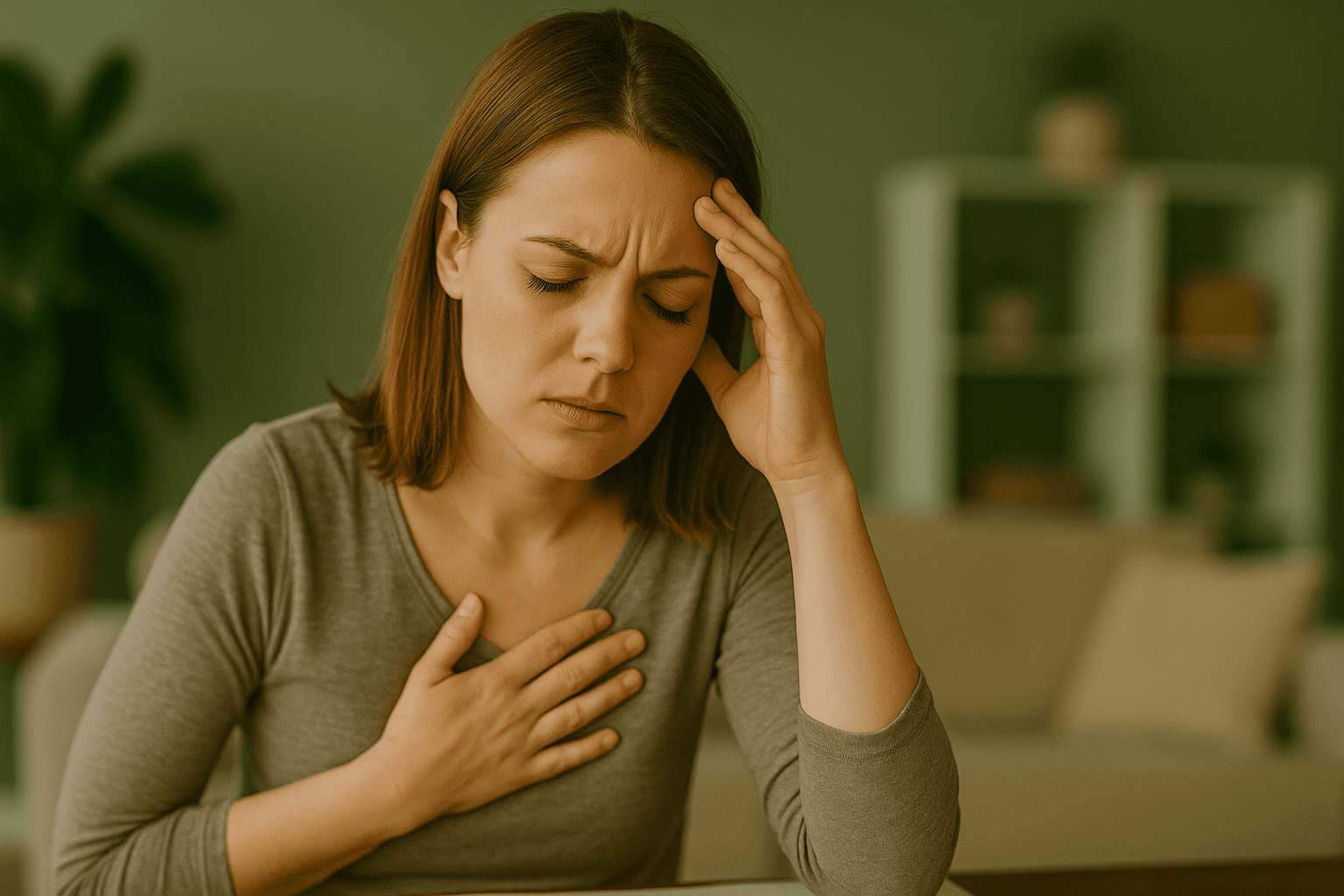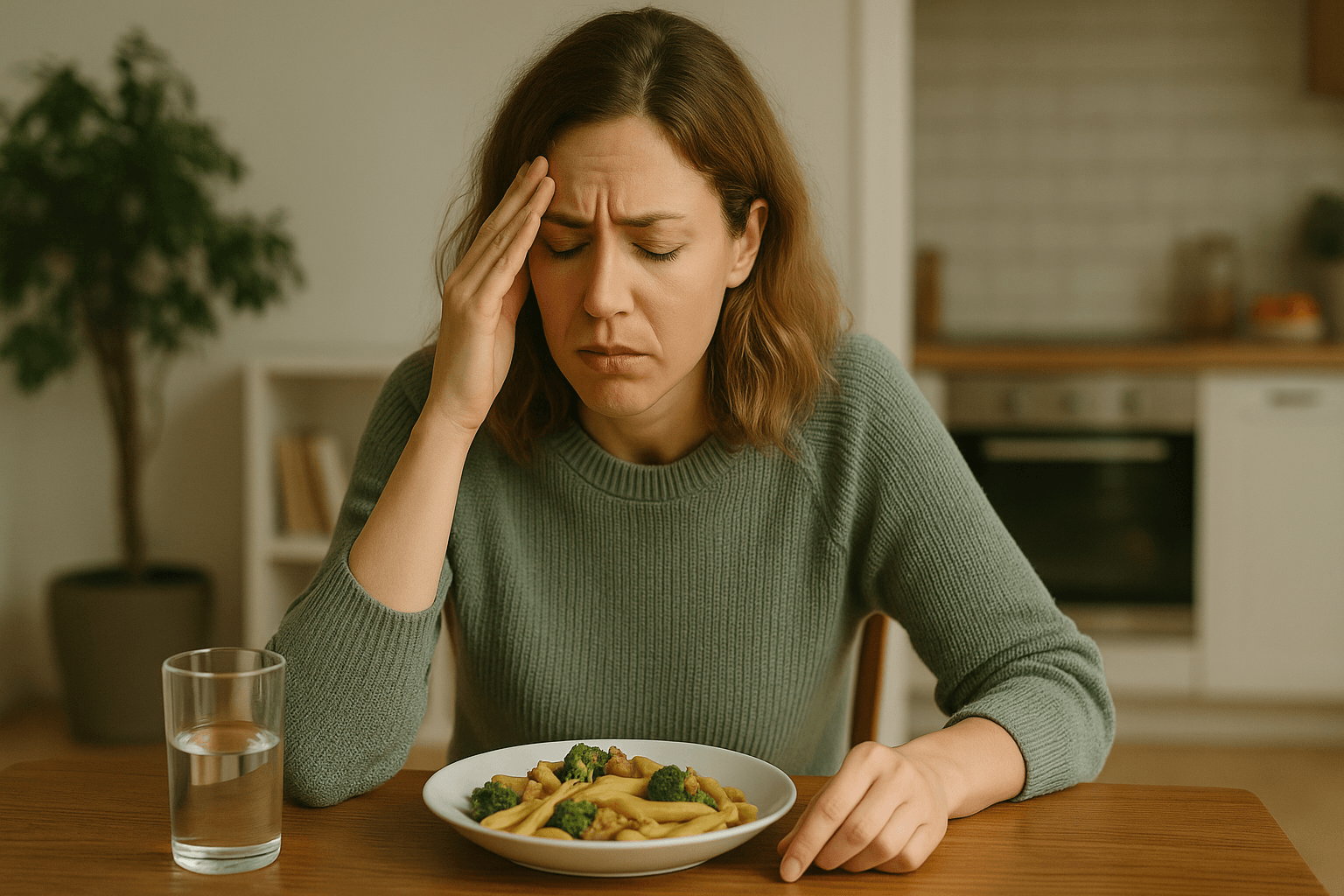Why You Feel Dizzy After Eating — And When to See a Doctor
Feeling dizzy after eating? Learn the common causes like low blood pressure or blood sugar, how to prevent it, and when to visit a doctor for evaluation.
By Team ArabiaMD

Why You Feel Dizzy After Eating — And When to See a Doctor
Feeling lightheaded or dizzy after eating can be unsettling. For some, it happens occasionally and passes quickly. For others, it’s frequent enough to cause concern. While it’s often not serious, dizziness after meals can sometimes be a sign that something in your body isn’t functioning as it should.
In this article, we’ll explore why dizziness after eating happens, what might be causing it, and when it’s time to see a doctor.
Common Reasons You Might Feel Dizzy After Eating
1. Postprandial Hypotension (Low Blood Pressure After Eating)
This is one of the most common reasons people feel dizzy after a meal.
When you eat, blood naturally flows to your digestive system to help break down food. To compensate, your heart beats faster, and your blood vessels constrict slightly to maintain normal blood pressure.
For some people — especially older adults or those with certain health conditions — this mechanism doesn’t work properly. As a result, blood pressure drops after eating, leading to symptoms such as:
- Dizziness or lightheadedness
- Fatigue
- Blurred vision
- Fainting
What you can do:
Try eating smaller, more frequent meals, and avoid heavy, high-carbohydrate meals which can trigger this response.

2. Reactive Hypoglycemia (Low Blood Sugar After Eating)
Another common cause is a sharp drop in blood sugar a few hours after eating. This happens when your body releases too much insulin in response to a meal, causing your blood sugar to fall below normal levels.
Symptoms can include:
- Shakiness or trembling
- Sweating
- Dizziness
- Weakness
- Anxiety or irritability
What you can do:
Opt for balanced meals with a mix of protein, healthy fats, and complex carbohydrates. Avoid skipping meals and limit foods high in refined sugar.
3. Dehydration
Sometimes the cause is as simple as not drinking enough water.
Dehydration can reduce blood volume, making it harder for your body to regulate blood pressure — especially after eating, when digestion already requires more blood flow.
Tip:
Drink water regularly throughout the day, and consider having a glass of water before and after meals.
4. Food Sensitivities or Allergies
Certain foods can trigger dizziness in people with food allergies or intolerances. This is more likely if dizziness happens consistently after eating a specific food.
Common triggers include:
- Gluten (in those with celiac disease or gluten sensitivity)
- Dairy products
- Nuts or shellfish
- Additives like MSG or artificial sweeteners
If you suspect a food allergy or intolerance, keeping a food diary can help identify patterns.
5. Inner Ear or Vestibular Disorders
If you’re prone to vertigo or balance issues, eating may sometimes worsen symptoms due to changes in blood pressure, fluid levels, or inflammation triggered by certain foods.
People with Ménière’s disease, for example, may feel dizzy after consuming salty foods that affect inner ear fluid balance.
6. Overeating
Sometimes the explanation is straightforward — you simply ate too much.
Overeating can make your body work harder to digest food, diverting blood flow from other parts of the body. This can lead to temporary dizziness, sluggishness, or fatigue.
Prevention tip:
Eat slowly, stop when you’re comfortably full, and avoid lying down immediately after eating.
7. Medications
Some medications can make you more prone to dizziness after meals, especially those that affect blood pressure or blood sugar levels.
Examples include:
- Blood pressure medications
- Diabetes medications (insulin or oral hypoglycemics)
- Diuretics
If you suspect your medication is causing dizziness, speak with your doctor before making any changes.
When to See a Doctor
Occasional dizziness after eating isn’t usually a cause for alarm. However, you should consult a doctor if you experience any of the following:
- Dizziness occurs frequently or lasts for more than a few minutes
- You faint or lose consciousness
- You experience chest pain, shortness of breath, or palpitations
- You have blurred vision, confusion, or weakness
- You notice dizziness occurs after specific foods or in combination with other symptoms (e.g., rash, swelling, nausea)
These symptoms may indicate an underlying condition such as diabetes, heart disease, or a neurological disorder that requires medical evaluation.

How a Doctor Can Help
Your doctor may:
- Check your blood pressure before and after eating
- Measure blood sugar levels to rule out hypoglycemia or diabetes
- Review your medications for possible side effects
- Order allergy or food intolerance tests
- Recommend lifestyle or dietary changes to stabilize blood sugar and blood pressure
If an underlying condition is diagnosed, early treatment can prevent complications and improve your quality of life.
Practical Tips to Prevent Dizziness After Eating
- Eat smaller, more frequent meals rather than large ones
- Avoid high-sugar and high-carb foods that can spike and crash blood sugar levels
- Stay hydrated throughout the day
- Limit alcohol and caffeine, which can dehydrate you
- Stand up slowly after eating, especially if you’ve been sitting for a long time
- Track your symptoms — when they happen, what you ate, and how long they lasted
The Bottom Line
Feeling dizzy after eating isn’t something to ignore — especially if it’s happening regularly. While the cause is often minor, it can sometimes signal an underlying issue like low blood pressure, low blood sugar, or a food intolerance.
If you notice this symptom repeatedly, schedule an appointment with a doctor. A simple checkup can help identify the cause and ensure your body is functioning the way it should.
Looking for a specialist?
You can find and book appointments with qualified doctors near you on ArabiaMD.com — the trusted platform for finding verified healthcare professionals across the region.